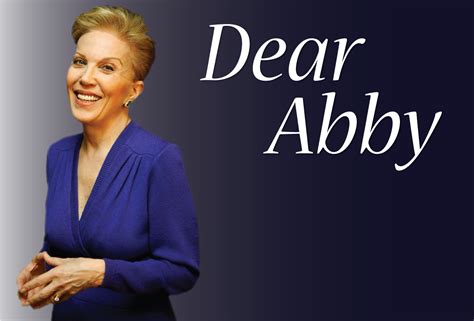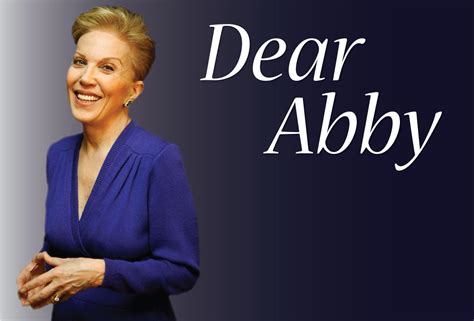
A woman writing to “Dear Abby” seeks guidance on whether to reveal to her husband the possibility that he is not the biological father of their 11-year-old son, a secret she has harbored since a drunken encounter decades ago.
A woman identified as “Wondering in Washington” has written to the “Dear Abby” advice column grappling with a decades-old secret: her husband might not be the biological father of their 11-year-old son. The woman confessed to a drunken encounter shortly before conceiving and is now torn between the desire to maintain her family’s peace and the ethical imperative of disclosing the truth to her husband.
According to the letter published in the advice column, the woman had a brief, alcohol-fueled encounter with another man prior to conceiving. “I had a drunken encounter with another man shortly before I conceived,” she wrote. Since then, she has been living with the uncertainty of whether her husband is indeed the father of her child. The question has resurfaced now that the child is growing up, and she feels the weight of the secret bearing down on her.
Abigail Van Buren, the author of “Dear Abby,” offered a measured response, highlighting the potential consequences of both revealing and concealing the truth. Abby advised, “If you want to preserve your marriage and prevent emotional damage to your son, resist the urge to ‘clear your conscience’ and take your secret to your grave.” This perspective emphasizes the potential disruption that such a revelation could cause within the family dynamic. Van Buren acknowledges the ethical dimensions of the situation but prioritizes the stability and well-being of the family unit.
The dilemma highlights a complex intersection of marital trust, parental rights, and personal ethics. The woman’s struggle reflects a broader societal conversation about the nature of family, the importance of genetic ties, and the potential impact of secrets on interpersonal relationships. The case underscores the complexities that can arise from infidelity and the long-lasting ramifications of choices made in moments of indiscretion.
The advice offered by “Dear Abby” also brings into focus the evolving role of advice columns in modern society. While such columns have traditionally served as a source of guidance on everyday issues, they now frequently address more sensitive and complex topics such as infidelity, identity, and ethical dilemmas. The Dear Abby column, which has been running for decades, continues to be a popular source for individuals seeking guidance on a wide range of personal matters. The response given by Van Buren in this instance reflects a pragmatic approach that balances the need for honesty with the potential for harm.
The situation presented by “Wondering in Washington” raises several key issues, including the potential impact on the husband, the child, and the marriage itself. Revealing the truth could lead to feelings of betrayal, anger, and uncertainty on the part of the husband, potentially fracturing the marital bond. For the child, discovering that his presumed father is not his biological father could lead to identity confusion, emotional distress, and strained relationships. Conversely, maintaining the secret could lead to feelings of guilt and anxiety on the part of the wife, as well as the risk of the truth eventually being revealed through other means, such as genetic testing.
The advancements in DNA testing have made it easier than ever to determine paternity, adding another layer of complexity to the situation. The availability of affordable and accessible DNA testing kits means that the possibility of the truth being uncovered without the wife’s consent is a real concern. This underscores the urgency of the woman’s dilemma and the need for careful consideration of the potential consequences of her actions.
Experts in family counseling and relationship therapy emphasize the importance of open communication and honesty in maintaining healthy relationships. However, they also acknowledge that there are situations where revealing certain truths may cause more harm than good. In such cases, it is essential to weigh the potential benefits of disclosure against the potential risks, and to consider the emotional well-being of all parties involved. Some experts suggest that seeking professional counseling can provide a safe and supportive environment for exploring these complex issues and making informed decisions.
The letter to “Dear Abby” and the response provided offer a glimpse into the complexities of human relationships and the challenges of navigating ethical dilemmas in the context of marriage and family. The situation highlights the importance of trust, communication, and empathy in maintaining healthy relationships, as well as the need for careful consideration of the potential consequences of our actions. It also underscores the enduring appeal of advice columns as a source of guidance and support for individuals grappling with personal challenges.
Expanded Details and Context
The situation described in the “Dear Abby” column touches upon several sensitive and complex themes within interpersonal relationships and family dynamics. These themes include:
-
Marital Fidelity and Betrayal: The core issue revolves around the wife’s past infidelity. Infidelity is a violation of trust, a fundamental pillar of most marriages. The act itself, even if isolated, can have long-lasting repercussions on the relationship, leading to feelings of betrayal, anger, and insecurity. The fact that the infidelity occurred before the birth of the child and potentially resulted in the child’s conception adds another layer of complexity. The husband has unknowingly been raising a child who may not be his own, blurring the lines of parental responsibility and genetic connection.
-
Paternity and Identity: The question of paternity goes beyond mere biological connection; it delves into the realm of identity and belonging. For the child, knowing who his biological father is can be a crucial part of understanding his genetic heritage and family history. Discovering that the man he has always known as his father is not his biological father can be deeply unsettling, potentially leading to an identity crisis and feelings of confusion and resentment. The situation raises questions about the nature of fatherhood itself – is it defined by genetics or by the nurturing and care provided?
-
The Weight of Secrets: The wife’s decision to keep the secret for over a decade has created a burden of guilt and anxiety. Secrets, especially those that involve significant aspects of one’s life, can be emotionally taxing, leading to stress, depression, and strained relationships. The fear of the secret being revealed can create a constant sense of unease, impacting the individual’s overall well-being. In this case, the wife’s secret not only affects her but also has the potential to impact her husband and son profoundly.
-
Ethical Dilemmas and Moral Obligations: The woman’s dilemma highlights the conflict between the desire to preserve her family’s peace and the perceived ethical obligation to disclose the truth. Some argue that honesty is always the best policy, regardless of the potential consequences. Others believe that there are situations where withholding the truth is justifiable, especially if it is done to protect others from harm. The ethical considerations involve weighing the potential benefits of disclosure against the potential risks, and determining what is in the best interests of all parties involved.
-
The Impact of DNA Testing: The increasing accessibility and affordability of DNA testing have significantly altered the landscape of paternity and family relationships. The ease with which paternity can be determined raises new questions about privacy, consent, and the right to know one’s genetic heritage. In this case, the woman’s fear of the truth being revealed through DNA testing underscores the urgency of her dilemma and the need for careful consideration of the potential consequences of her actions.
-
The Role of Forgiveness and Reconciliation: If the woman were to reveal the truth, the potential for forgiveness and reconciliation would depend on several factors, including the husband’s capacity for empathy, the strength of their marital bond, and their willingness to seek professional counseling. Forgiveness is a complex process that requires time, understanding, and a genuine desire to move forward. Reconciliation may involve rebuilding trust, addressing underlying issues, and establishing new boundaries.
Analyzing Dear Abby’s Advice
Abigail Van Buren’s advice to “take your secret to your grave” is a controversial one, but it is rooted in a pragmatic assessment of the potential consequences of disclosure. Her perspective prioritizes the stability and well-being of the family unit, suggesting that in this particular case, the potential harm of revealing the truth outweighs the perceived benefits.
Several factors may have influenced Van Buren’s advice:
-
The Length of Time: The fact that the secret has been kept for over a decade suggests that the family has established a stable and loving dynamic. Revealing the truth now could disrupt this dynamic and create unnecessary turmoil.
-
The Age of the Child: The child is 11 years old, meaning he has already formed a strong bond with his presumed father. Discovering that his father is not his biological father could be particularly traumatic at this stage in his development.
-
The Potential for Damage: Van Buren likely considered the potential for emotional damage to all parties involved. The husband could experience feelings of betrayal, anger, and grief. The child could feel confused, resentful, and insecure. The wife could experience guilt, anxiety, and regret.
-
The Lack of a Compelling Reason to Disclose: In some cases, there may be a compelling reason to disclose the truth, such as a medical condition that requires knowledge of the child’s genetic history. However, in this case, there does not appear to be any such reason.
While Van Buren’s advice may be seen as controversial, it reflects a common viewpoint that in certain situations, preserving the status quo is the best course of action. However, it is important to note that this is just one perspective, and other experts may offer different advice.
Alternative Perspectives and Potential Actions
While “Dear Abby” advises keeping the secret, other approaches could be considered, each with its own set of potential consequences:
-
Seeking Professional Counseling: The wife could seek individual or couples counseling to explore her feelings and options in a safe and supportive environment. A therapist can help her weigh the potential benefits and risks of disclosure, and develop a plan for how to proceed.
-
Gradual Disclosure: Instead of revealing the truth all at once, the wife could consider a more gradual approach. She could start by discussing her feelings of guilt and anxiety with her husband, without initially revealing the specific details of her secret. This could allow him to become more emotionally prepared for the possibility that something significant has been withheld.
-
Focusing on the Present Relationship: The wife could focus on strengthening her relationship with her husband and son, without necessarily revealing the truth about the child’s paternity. She could prioritize open communication, quality time, and shared experiences, creating a more solid foundation for the family.
-
Contingency Planning: The wife could develop a contingency plan for how to handle the situation if the truth is revealed through other means, such as DNA testing. This could involve seeking legal advice, preparing a statement to share with her husband and son, and identifying sources of support.
Ultimately, the decision of whether or not to reveal the truth is a personal one that only the wife can make. It is important for her to carefully consider all of the potential consequences and to choose the course of action that she believes is in the best interests of her family.
The Importance of Context and Individual Circumstances
It is crucial to remember that every situation is unique, and what works for one family may not work for another. The advice offered by “Dear Abby” is based on the limited information provided in the letter, and it may not be applicable to all cases.
Factors that could influence the decision include:
-
The Strength of the Marital Bond: A strong and loving marriage may be better equipped to withstand the shock of a revelation than a marriage that is already struggling.
-
The Husband’s Personality: Some individuals are more forgiving and understanding than others. The husband’s personality and past reactions to difficult situations could provide clues as to how he might respond to the news.
-
The Family’s Values: Some families place a high value on honesty and transparency, while others prioritize stability and harmony. The family’s values could influence the decision of whether or not to disclose the truth.
-
The Availability of Support: The availability of support from family, friends, or professionals can make a significant difference in how the situation is handled.
Conclusion
The “Dear Abby” scenario presents a multifaceted ethical and emotional challenge. The woman’s dilemma highlights the enduring complexities of marriage, paternity, and the weight of secrets. While “Dear Abby” offers a pragmatic approach, emphasizing the potential harm of disclosure, other perspectives and potential actions exist. The decision ultimately rests with the woman, requiring careful consideration of all potential consequences and the unique circumstances of her family. The case serves as a reminder of the importance of trust, communication, and empathy in navigating the intricacies of human relationships.
Frequently Asked Questions (FAQ)
1. What is the main issue in the “Dear Abby” letter?
The main issue is that a woman (“Wondering in Washington”) wrote to “Dear Abby” seeking advice on whether to tell her husband that he might not be the biological father of their 11-year-old son. She had a drunken encounter with another man shortly before conceiving and has kept the secret ever since.
2. What advice did Dear Abby give the woman?
Abby advised the woman to “resist the urge to ‘clear your conscience’ and take your secret to your grave.” She suggested that revealing the truth could cause significant emotional damage to her husband and son, potentially jeopardizing her marriage.
3. What are the potential consequences of revealing the truth?
Revealing the truth could lead to several negative consequences:
- For the Husband: Feelings of betrayal, anger, resentment, and questioning of his identity as a father.
- For the Child: Identity confusion, emotional distress, feelings of insecurity, and potentially strained relationships with both his presumed father and biological father (if identified).
- For the Marriage: Potential for divorce, loss of trust, and significant damage to the marital bond.
- For the Wife: While she might feel relief from unburdening herself, she would also face the consequences of the fallout and potential backlash from her husband and son.
4. What are the potential consequences of keeping the secret?
Keeping the secret also has potential consequences:
- For the Wife: Ongoing guilt, anxiety, and fear of the truth being discovered, impacting her mental and emotional well-being.
- For the Family: The possibility of the truth being revealed unexpectedly (e.g., through DNA testing), which could be even more damaging than a planned disclosure.
- For the Husband: Living a life based on a lie, potentially missing out on knowing his true family history.
- Ethical Considerations: The inherent moral dilemma of withholding such significant information from her husband.
5. What are some alternative approaches to consider besides keeping the secret?
Some alternative approaches include:
- Seeking Professional Counseling: Individual or couples therapy to explore her feelings and options in a safe environment.
- Gradual Disclosure: Sharing her feelings of guilt and anxiety with her husband without initially revealing the specific details.
- Focusing on Strengthening the Relationship: Prioritizing communication, quality time, and shared experiences with her husband and son.
- Contingency Planning: Preparing for the possibility of the truth being revealed through other means, such as DNA testing.
Additional Points that could be included if the article needed to be expanded beyond the 2000-word minimum:
Legal Considerations (Disclaimer: This is not legal advice and consulting a legal professional is advised for specific cases):
While the “Dear Abby” letter focuses on the emotional and ethical aspects of the situation, there are also potential legal considerations to be aware of, although these are complex and vary greatly depending on jurisdiction.
-
Paternity Laws: Paternity laws determine the legal father of a child. In most jurisdictions, the husband is presumed to be the legal father if he is married to the mother at the time of the child’s birth. Challenging paternity years later can be a difficult and complex legal process, often requiring DNA evidence and court proceedings. Time limits for challenging paternity may also apply.
-
Child Support and Custody: Even if the husband is not the biological father, he may still have legal obligations to provide child support and have visitation rights if he has acted as the child’s father and established a parental relationship. Courts often prioritize the best interests of the child when making decisions about custody and support.
-
Inheritance Rights: The child’s inheritance rights could be affected depending on whether paternity is legally established. If the husband is legally recognized as the father, the child would have inheritance rights from him. If paternity is disproven, the child would not inherit from the husband but would potentially inherit from the biological father if paternity is established with him.
-
Fraud and Misrepresentation: In some limited cases, if the wife intentionally misrepresented the child’s paternity and the husband relied on that misrepresentation to his detriment, he might have a claim for fraud or misrepresentation. However, such claims are difficult to prove and are rarely successful.
-
Statute of Limitations: There may be statutes of limitations that apply to legal actions related to paternity, fraud, or other claims arising from the misrepresentation of paternity. It is important to consult with an attorney to determine whether any applicable statutes of limitations have expired.
The Psychological Impact of Paternity Uncertainty
The uncertainty surrounding paternity can have a profound psychological impact on all parties involved:
-
On the Husband: Experiencing a “paternity shock” can lead to feelings of anger, betrayal, grief, and loss of identity. He may question the foundation of his marriage and family, and struggle to reconcile his love for the child with the realization that he may not be the biological father. The psychological distress can manifest in symptoms of depression, anxiety, and post-traumatic stress disorder.
-
On the Wife: The burden of keeping the secret can lead to chronic stress, anxiety, and guilt. She may experience feelings of shame and self-blame, and struggle with the moral implications of her actions. The constant fear of the truth being revealed can create a sense of unease and insecurity in her relationships.
-
On the Child: Learning about the uncertainty surrounding his paternity can disrupt his sense of identity and belonging. He may experience feelings of confusion, anger, and resentment towards both his presumed father and his mother. He may question his genetic heritage and struggle to understand his place in the family.
The Role of Genetic Ancestry Testing
The rise of direct-to-consumer genetic ancestry testing has added another layer of complexity to the issue of paternity. These tests can reveal unexpected genetic relationships and family secrets, potentially leading to the discovery of non-paternity.
-
Ethical Considerations: Genetic ancestry testing raises ethical questions about the right to know one’s genetic heritage versus the potential for causing emotional harm. Should individuals have the right to access information about their genetic relationships, even if it disrupts existing family dynamics?
-
Unexpected Discoveries: Genetic ancestry tests can reveal unexpected relationships, such as half-siblings, cousins, or even non-paternity. These discoveries can have a profound impact on individuals and families, leading to emotional distress, identity confusion, and strained relationships.
-
Privacy Concerns: Genetic ancestry testing companies collect and store sensitive genetic information. Concerns have been raised about the privacy and security of this data, and the potential for it to be used for discriminatory purposes.
Societal Perspectives on Paternity and Family
Societal perspectives on paternity and family have evolved over time:
-
Traditional Views: Historically, paternity was considered essential for establishing lineage, inheritance rights, and social status. The biological connection between father and child was seen as fundamental to the family unit.
-
Modern Views: In modern society, the definition of family has become more fluid and inclusive. Stepfamilies, blended families, and same-sex families are increasingly common. The emphasis has shifted from biological connections to the emotional bonds and shared experiences that define a family.
-
Evolving Legal Frameworks: Legal frameworks are gradually adapting to reflect these changing societal perspectives. Laws regarding adoption, surrogacy, and same-sex marriage are evolving to recognize and protect the rights of diverse family structures.
Supporting Resources
Individuals and families grappling with issues related to paternity can find support from various resources:
-
Therapists and Counselors: Licensed therapists and counselors can provide individual, couples, or family therapy to address the emotional and psychological challenges associated with paternity uncertainty.
-
Support Groups: Support groups offer a safe and supportive environment for individuals to share their experiences and connect with others who are facing similar challenges.
-
Online Forums and Communities: Online forums and communities provide a platform for individuals to connect with others, ask questions, and share information.
-
Legal Professionals: Attorneys specializing in family law can provide legal advice and guidance on issues related to paternity, child support, and custody.
The “Dear Abby” letter serves as a powerful reminder of the enduring complexities of human relationships and the profound impact that secrets and lies can have on individuals and families. Navigating these challenges requires careful consideration, empathy, and a willingness to seek support when needed.









